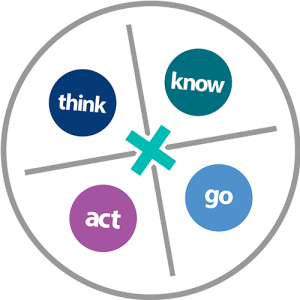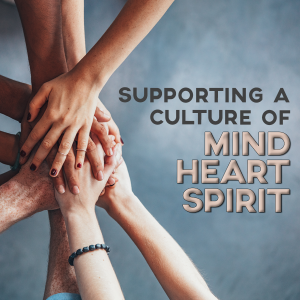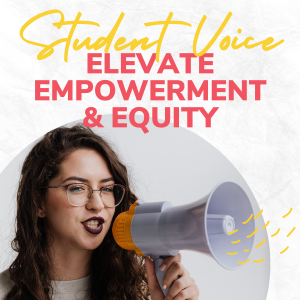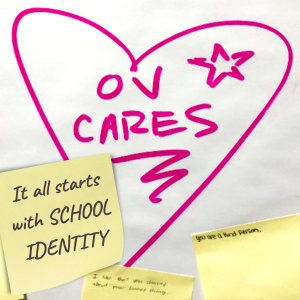[vc_row][vc_column][vc_column_text]Recently, I had the opportunity to ask Dr. Kristine Chadwick, Inflexion’s Director of Planning, Research, and Evaluation, for her thoughts on how our research can be useful to educators. We focused on what we are learning through the lens of our organization’s approach to changing the education system. A key component of the Inflexion Approach is building from the foundation of strength and skills that students, educators, and families already use daily as they interact within educational systems. We are inspired by Kristine’s vision of how our research supports educators and ultimately students to use the power already within their communities to better prepare all students to be ready for their futures.[/vc_column_text][vc_column_text][dt_quote type=”pullquote” layout=”right” font_size=”big” animation=”none” size=”1″]What work are you doing right now that you are most excited about in relation to the Inflexion Approach?[/dt_quote][/vc_column_text][vc_column_text]
 “I remember the day we found out we received a grant from the Hewlett Foundation to engage in a research-practice partnership on reflection as a deeper learning competency. I squealed in delight. Scaling up reflective practices will require that school communities infuse reflection as a critical component of school identity, that the school’s very purpose depends on having both the kids and the adults in the building focused not only on action but on reflecting on that action in order to learn and improve. Reflection is so core to learning that it has to be embedded in how schools operate–in what people value with their time, energy, and other resources.”
“I remember the day we found out we received a grant from the Hewlett Foundation to engage in a research-practice partnership on reflection as a deeper learning competency. I squealed in delight. Scaling up reflective practices will require that school communities infuse reflection as a critical component of school identity, that the school’s very purpose depends on having both the kids and the adults in the building focused not only on action but on reflecting on that action in order to learn and improve. Reflection is so core to learning that it has to be embedded in how schools operate–in what people value with their time, energy, and other resources.”
[/vc_column_text][vc_column_text][dt_quote type=”pullquote” layout=”right” font_size=”big” animation=”none” size=”1″]What are you most curious about learning through our research as we use the Inflexion Approach with schools?[/dt_quote][/vc_column_text][vc_column_text]
“I want to know the developmental paths of schools that try the Inflexion Approach to improving their ability to nurture comprehensive readiness in all students. I also am curious about what the core similarities are among all schools that use the Approach and what the unique adaptations are. I want to articulate through our research where the leverage points are for change when one considers a school’s identity, infrastructure, and learning systems.”
[/vc_column_text][/vc_column][/vc_row][vc_row type=”1″][vc_column][vc_column_text]
“We are working in a system that was never designed to serve all children well. But we’re all trying to do that now without fully articulating the structural barriers we face in the education system. Our research on the Inflexion Approach can help us understand the importance of school identity and how identity is constructed through the input of the school community”
[/vc_column_text][/vc_column][/vc_row][vc_row][vc_column][vc_column_text][dt_quote type=”pullquote” layout=”right” font_size=”big” animation=”none” size=”1″]What are the biggest challenges the education community needs to overcome to ensure all students are ready for their futures? And as a follow up, how can our research help address these challenges? Any examples of how we’ve done this in the past that you would like to highlight?[/dt_quote][/vc_column_text][vc_column_text]
“We are working in a system that was never designed to serve all children well. But we’re all trying to do that now without fully articulating the structural barriers we face in the education system. Our research on the Inflexion Approach can help us understand the importance of school identity and how identity is constructed through the input of the school community. We have been doing case studies of schools that have strong programs and processes that encourage student and staff reflection as part of the school’s culture. This investigation has been inspiring. These school’s stories are amazing–they are able to deepen both student learning and school improvement by valuing reflection and it’s so obvious when you look at the walls or talk to students or staff. The depth of thinking and connections they can make are testament to the power of embedding reflection into the core of the school’s mission. I leave these schools more excited about my work than I was before–and I’ve been excited about the work for years!”
[/vc_column_text][vc_column_text][dt_quote type=”pullquote” layout=”right” font_size=”big” animation=”none” size=”1″]What are the research teams’ plans for disseminating what we’ve learned to the education community? Are there any interesting reports or presentation you expect to share in the near future?[/dt_quote][/vc_column_text][vc_column_text]
 “We are able to share our arts integration work widely because it’s been such a tight grant-funded project and it’s far enough along that we have some interesting findings about both process and outcomes to share with the research and practitioner communities. We presented at the American Educational Research Association in April. Our arts integration research and development project is turning out to be very aligned with the Inflexion Approach. We’re finding that school personnel need to believe the arts and studio habits of mind are central to the mission and core identity of their schools in order for an integration model to be successful.”
“We are able to share our arts integration work widely because it’s been such a tight grant-funded project and it’s far enough along that we have some interesting findings about both process and outcomes to share with the research and practitioner communities. We presented at the American Educational Research Association in April. Our arts integration research and development project is turning out to be very aligned with the Inflexion Approach. We’re finding that school personnel need to believe the arts and studio habits of mind are central to the mission and core identity of their schools in order for an integration model to be successful.”
[/vc_column_text][vc_column_text][dt_quote type=”pullquote” layout=”right” font_size=”big” animation=”none” size=”1″]What research have you encountered from outside our organization that has inspired you or refocused your thoughts recently?[/dt_quote][/vc_column_text][vc_column_text]
“I just read this interesting research article by Giada Di Stefano and her colleagues about practice versus reflection and which was more important for improving performance–any performance. In the end, what matters is that we all have to have some practice and then reflect in order to improve. This is so important for us to think about as an organization, both internally and in terms of what we recommend as promising practice to our clients. We have to set time aside in our busy schedules to actually think about what we’re doing, how things are going, what’s going well, and how we might change to do even better. If we just “do do do” we’re not going to learn to improve. And yet this research study also showed that most people will choose more practice over time to reflect, which just shows me how important it is to press the value of reflection. I think we all know reflection is important, but it can be uncomfortable, and we all need to embrace the discomfort because it’s literally how we learn.”
[/vc_column_text][vc_column_text][dt_quote type=”pullquote” layout=”right” font_size=”big” animation=”none” size=”1″]How would you describe a future where schools are able to effectively prepare all students to be ready for life after high school?[/dt_quote][/vc_column_text][vc_column_text]
“Schools will always help students learn content. There’s no doubt that content and basic academic skills are important. They are necessary but not sufficient. Nowadays, everyone has facts at their fingertips. Nobody needs to memorize facts because they are ubiquitously available. What schools need to do is help students develop the skills to discern facts from falsities, and the skills that will allow them to maximize the application of the skills they develop.”
[/vc_column_text][vc_column_text][dt_quote type=”pullquote” layout=”right” font_size=”big” animation=”none” size=”1″]Anything else you’d like to share?[/dt_quote][/vc_column_text][vc_column_text]
“Professionally, I was raised on systems theory. From my doctoral courses in community psychology and organizational theory and behavior to the community-level change projects on which I worked as a graduate student, I have always been drawn to the complexity of systems and how to make them better serve communities. I feel very at home at Inflexion, and passionate about the work we are now doing with schools.”
[/vc_column_text][/vc_column][/vc_row]



